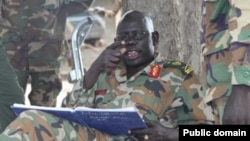In a clear warning to both those in government and those leading rebel forces who are contributing, or considering contributing, to the terrible violence taking place in South Sudan, the United States has imposed sanctions on two individuals it has identified as committing or ordering human rights abuses or obstructing the peace process there.
The U.S. Treasury Department announced May 6 that it was taking action against South Sudanese Major General Marial Chanuong and rebel commander Peter Gadet, freezing any assets they may hold in the United States and barring U.S. citizens or companies from dealing with them.
Chanuong, commander of the government’s Presidential Guard, commanded troops that slaughtered hundreds of civilians in Juba when the conflict first erupted in December. Gadet in turn led the troops accused of the ethnically motivated killing of more than 200 civilians last month when rebel forces captured the town of Bentiu, capital of Unity state.
The United States and others in the international community have long urged that those choosing violence in the South Sudan political crisis be held accountable. The sanctions initiative signals that the time for words is over and action is now due.
Hopes have been raised that the violence may ebb with an agreement by South Sudan’s government and the rebels to facilitate humanitarian assistance to civilians caught in the conflict and the upcoming meeting between President Salva Kiir and former Vice President Riek Machar. This follows a high level meeting between U.S. Secretary of State John Kerry and President Kiir. Given yet another opportunity to end the destruction and death, the parties should seize the day and do everything in their power to resolve the political crisis and begin a process of national dialogue and reconciliation.
The choices that government and opposition leaders face are stark and clear. The human costs of the conflict have been enormous and would likely grow if a settlement is not reached. There can be no military solution to the crisis since what the parties are fighting to control would be destroyed. Before the promise of South Sudan’s future is soaked in more blood, President Kiir and the opposition must work immediately for a true cessation of hostilities and move toward an understanding of the nation’s future governance.
The U.S. Treasury Department announced May 6 that it was taking action against South Sudanese Major General Marial Chanuong and rebel commander Peter Gadet, freezing any assets they may hold in the United States and barring U.S. citizens or companies from dealing with them.
Chanuong, commander of the government’s Presidential Guard, commanded troops that slaughtered hundreds of civilians in Juba when the conflict first erupted in December. Gadet in turn led the troops accused of the ethnically motivated killing of more than 200 civilians last month when rebel forces captured the town of Bentiu, capital of Unity state.
The United States and others in the international community have long urged that those choosing violence in the South Sudan political crisis be held accountable. The sanctions initiative signals that the time for words is over and action is now due.
Hopes have been raised that the violence may ebb with an agreement by South Sudan’s government and the rebels to facilitate humanitarian assistance to civilians caught in the conflict and the upcoming meeting between President Salva Kiir and former Vice President Riek Machar. This follows a high level meeting between U.S. Secretary of State John Kerry and President Kiir. Given yet another opportunity to end the destruction and death, the parties should seize the day and do everything in their power to resolve the political crisis and begin a process of national dialogue and reconciliation.
The choices that government and opposition leaders face are stark and clear. The human costs of the conflict have been enormous and would likely grow if a settlement is not reached. There can be no military solution to the crisis since what the parties are fighting to control would be destroyed. Before the promise of South Sudan’s future is soaked in more blood, President Kiir and the opposition must work immediately for a true cessation of hostilities and move toward an understanding of the nation’s future governance.






